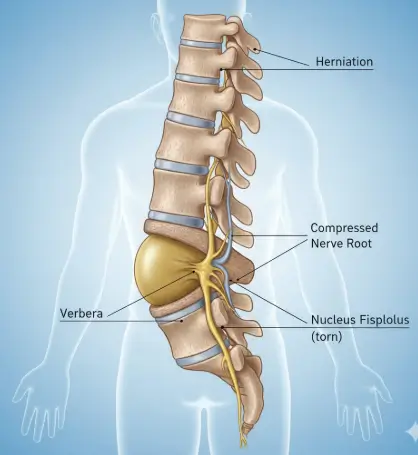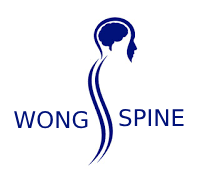- Home
- Herniated Disc
Herniated Disc
- Spinal Myelopathy Specialist
Herniated Disc Treatment in Los Angeles, CA
If you’ve ever felt sharp back pain that shoots down your leg or a constant tingling in your arm, there’s a good chance a herniated disc is to blame.
Your spinal discs act as naturally cushion structures between your vertebrae, and when damaged, a herniated disc can cause significant discomfort, including pain, numbness, or weakness. Disc herniation is one of the most common spine conditions and, thankfully, also one of the most treatable.
Dr. Albert P. Wong, a trusted neurosurgeon and herniated disc specialist serving patients in Los Angeles and Beverly Hills, helps diagnose and provide lasting relief from disc herniation and other disc-related pain. He offers personalized, minimally invasive treatments designed to restore mobility and help you live comfortably again.
- What It Is
What Is a Herniated Disc?
Your spine is made up of bones called vertebrae, separated by soft, cushion-like intervertebral discs that act as shock absorbers. A herniated disc, sometimes called a slipped disc or ruptured disc, occurs when the soft inner core of a spinal disc pushes through its tough outer layer.
When this portion of the disc presses on nearby nerves, it can lead to pain, numbness, or weakness that may radiate through your arms or legs, depending on whether the herniation is cervical (neck) or lumbar (lower back).
While the condition may sound serious, many cases of disc disease or degenerative disc changes can be managed effectively with conservative treatments when addressed early.
For persistent or severe symptoms, procedures such as a discectomy may be recommended by a trusted herniated disc specialist.
Common causes and related conditions include:
- Degenerative disc disease
- Bulging discs
- Other disc problems
Early diagnosis and proper care are crucial to prevent complications and improve quality of life for anyone experiencing symptoms of a herniated disc.

Herniated Disc: Causes, Diagnosis, and Treatment
Discs are soft cushions that protect the spinal column and spinal cord, but they naturally wear and tear with age. A herniated disc, sometimes called a slipped disc, occurs when the soft inner portion of a disc pushes through its outer layer, which can put pressure on a spinal nerve and cause pain.
Common Symptoms
A herniated disc can occur anywhere along the spine, but it’s most common in the lower back (lumbar herniated disc) and neck (cervical herniated disc). Symptoms of a herniated disc may include:
Sharp or burning back or neck pain.
Pain radiating down one leg (sciatica) or one arm.
Tingling, numbness, or “pins and needles” sensation.
Muscle weakness or fatigue.
Pain that worsens when coughing, sneezing, or sitting too long.
A herniated disc may press on nearby nerves, causing significant pain and discomfort. Early diagnosis and treatment from a trusted herniated disc specialist can help manage symptoms and prevent complications.
Causes & Risk Factors
While discs naturally degrade over time, several factors can increase your risk of developing a herniation, including:
Age-related degeneration, the most common cause
Repetitive strain or heavy lifting with poor form
Sudden injury or trauma to the spine
Sedentary lifestyle and weak core muscles
Obesity, which adds stress to low back and other parts of the spine
Genetic factors, which can make discs more prone to rupture
Most herniated discs occur in adults aged 30–50, according to the Mayo Clinic and NIH, though anyone can be affected.
Symptoms can range from mild to severe, and patients may experience low back pain, pain down the buttock or back of the thigh, tingling in the leg, loss of sensation, or weakness.
Diagnosis & Evaluation
Because herniated discs can mimic other disc-related problems, Dr. Wong, a trusted spine specialist, takes a careful approach to diagnose a herniated disc. His evaluation may include:
MRI scans to visualize the disc and surrounding spinal nerves
CT scans for detailed assessment of the spinal column
X-rays to rule out other causes of low back pain
Neurological exams to check reflexes, sensation, and muscle strength
This thorough evaluation helps determine the treatment plan and ensures the appropriate treatment for each patient.
Treatment Options
Most patients improve with non-surgical care, but Dr. Wong tailors each treatment plan based on symptoms, lifestyle, and goals.
Non-Surgical Treatments:
Physical therapy focusing on stretching, posture, and core strengthening.
Epidural steroid injections to reduce inflammation around the affected spinal nerve.
Pain management programs, including medication and guided exercises.
Activity modification and ergonomic adjustments.
Surgical Treatments:
If symptoms persist or nerve compression is severe, spine surgery may be recommended. Dr. Wong specializes in minimally invasive techniques, including:
Microdiscectomy — a minimally invasive procedure to remove the damaged disc portion and relieve pressure.
Spinal Fusion — stabilizes the spine after disc removal.
Artificial Disc Replacement — preserves motion while restoring stability.
- Get Appointment
Schedule Your Herniated Disc Consultation Today
Don’t let a herniated disc limit your life. Schedule a consultation with Dr. Albert P. Wong, a trusted herniated disc specialist serving Los Angeles and Beverly Hills, for advanced, personalized care designed to restore mobility and reduce pain and discomfort.
- Faqs
FAQs About Herniated Discs
Surgery is considered when symptoms persist despite conservative treatment, if there is significant muscle weakness or loss of function, or if there are serious complications such as loss of bladder or bowel control, which require immediate attention.
Prevention involves maintaining good posture, exercising regularly to strengthen core muscles, lifting objects properly, avoiding excessive strain, and keeping a healthy body weight to reduce pressure on the spine.
Non-surgical treatments include physical therapy to strengthen supporting muscles, medications like anti-inflammatories for pain, steroid injections to reduce inflammation, and lifestyle changes such as weight management and posture correction.
Many herniated discs improve naturally with time, as inflammation decreases and the disc stabilizes, with most patients seeing improvement within six to twelve weeks without surgery.
Symptoms often include localized back or neck pain, radiating pain down the arms or legs (such as sciatica), numbness or tingling in extremities, and weakness in the muscles served by the affected nerves.
